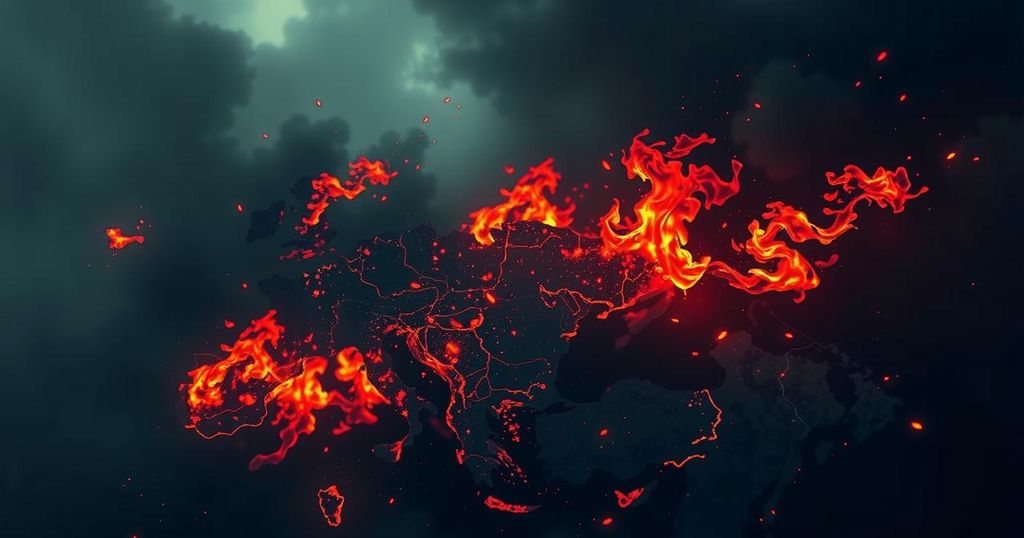Global news
ALEPPO, ARAB GULF STATES INSTITUTE, ASIA, BASHA, BASHAR AL - ASSAD, CIVILIAN CASUALTIES, CONFLICT, IRAN, IRAQ, ISLAMIC STATE, MIDDLE EAST, MILITARY OPERATIONS, MOBILIZATION, MOHAMMED KAKAI, MOHAMMED SHIA AL - SUDANI, NINEVEH, PMF, REC, S SECURITY COMMITTEE, SYRIA, TERRORISM
Jamal Walker
0 Comments
Iraq Voices Concerns Over Violence Escalation in Syria and Security Implications
Iraqi officials express concerns over the impact of escalating violence in Syria, especially following the capture of Aleppo by rebel forces. Prime Minister al-Sudani asserts Iraq’s commitment to safeguarding its national interests while navigating the complex relationship with the Syrian government and Iran. The resurgence of the Islamic State poses additional challenges that Iraqi security forces must address in protecting their borders.
Concerns regarding the escalating violence in Syria have prompted officials in Iraq to express fears over potential spillover effects into their already precarious situation. Following the capture of Syria’s Aleppo by rebel forces and militants, Iraqi Prime Minister Mohammed Shia al-Sudani emphasized during a recent conversation with Turkish President Recep Tayyip Erdogan that Iraq would not remain passive during these serious developments. He assured that Iraq would undertake all necessary measures to protect both its own security and that of Syria.
In light of the worsening situation, various Iraqi officials have shown support for Syrian President Bashar al-Assad’s government, particularly after its challenges from rebel forces advancing in northwestern Syria. Reports indicate that militias backing Iran, primarily the Popular Mobilization Forces (PMF), have begun moving toward Syria to reinforce the Assad regime. However, Rasha al Aqeedi from the Arab Gulf States Institute has noted that while there is evidence of Iraqi forces mobilizing toward the border, there is no confirmation that these factions have crossed into Syria.
Iraq shares a border of approximately 600 kilometers with Syria and has consistently supported the Syrian government throughout the long civil conflict. Additionally, Iraq has allied closely with Iran, a significant supporter of the Assad government. Among Iraq’s primary concerns is the resurgence of the Islamic State (IS), which previously controlled extensive territories in both Iraq and Syria. Aqeedi highlighted that this group may seek to reestablish its influence amid the ongoing unrest in Syria.
Nonetheless, she cautioned that deploying Iraqi security forces to the Syrian border could create vulnerabilities in regions like Nineveh and Kirkuk, which might become targets for IS attacks. In response to the situation, Iraqi military leadership in Mosul reported bolstered security measures, including the installation of thermal security cameras along the Syrian border. These measures are aimed at preemptively addressing any potential violence that may disrupt stability in both Mosul and Iraq.
Collaboration with Kurdish-led, U.S.-backed Syrian Democratic Forces (SDF) has intensified, with increased intelligence sharing about potential threats originating from Syria. Despite this proactive stance, Saif al-Saadi, an Iraqi affairs analyst, pointed out that Iraq is legally bound to respect its neighbors’ sovereignty per Article 8 of its constitution and must avoid interference in the internal affairs of Syria. He reiterated that the Iraqi Prime Minister, as the commander of armed forces, is mandated to safeguard the border and prevent any PMF involvement in Syria, which could negatively impact Iraq.
The situation in Syria has become increasingly volatile, particularly with the recent control of Aleppo by rebel forces, instigating fears in Iraq about potential consequences. Iraq’s intricate relationship with Syria and Iran plays a significant role in shaping its response to the ongoing conflict, as it balances national security concerns against legal constraints on foreign involvement. The resurgence of the Islamic State also looms large, underscoring the complexities faced by Iraqi officials as they navigate these developments.
In summary, Iraqi officials are increasingly alarmed by the developments in Syria, particularly the rise of rebel forces and the implications for Iraq’s security. Prime Minister al-Sudani has pledged a proactive response, emphasizing cooperation with Syrian authorities and military operations along the border. However, legal limitations and concerns regarding the disturbance of stability in Iraqi regions vulnerable to IS activity remain pivotal as authorities tread carefully in their engagements related to Syria.
Original Source: www.voanews.com




Post Comment